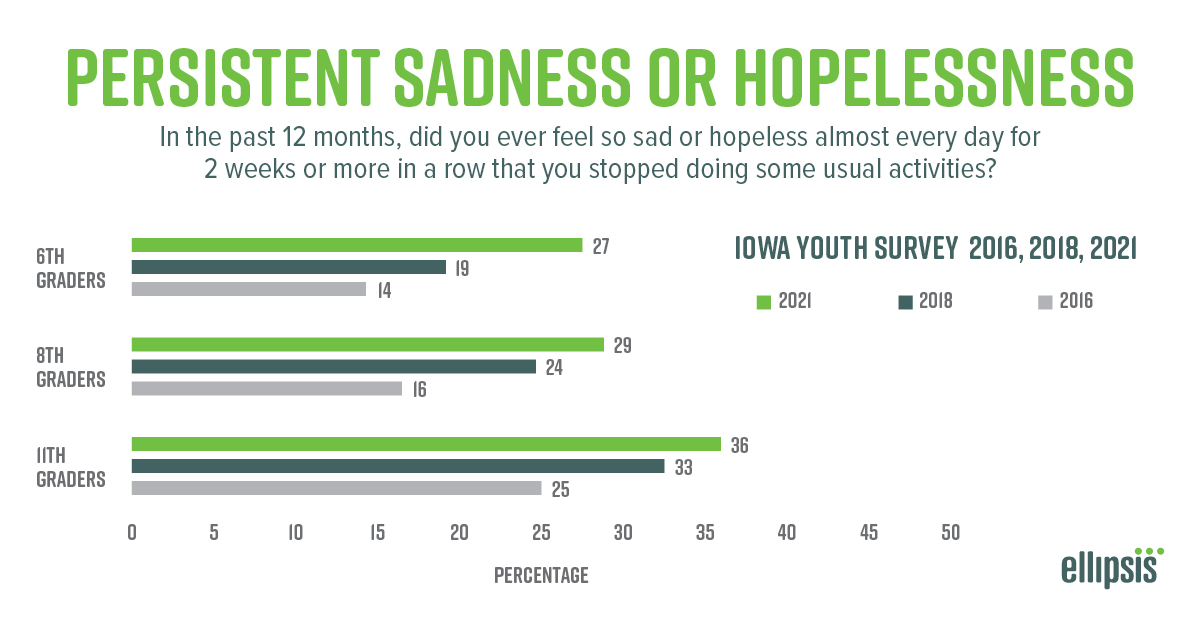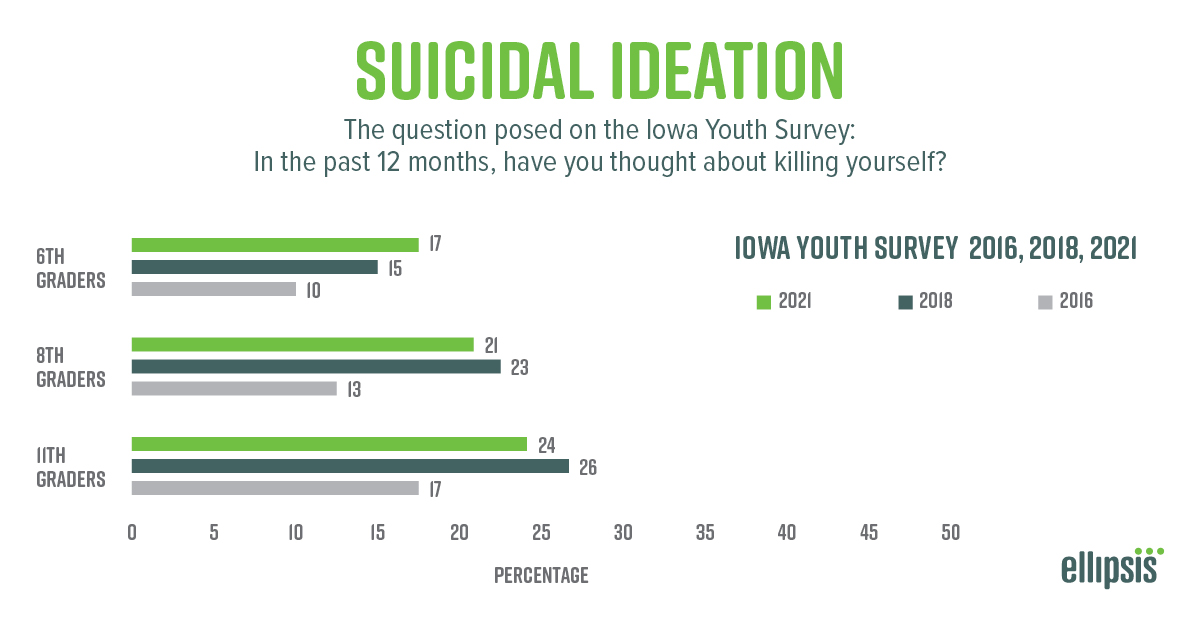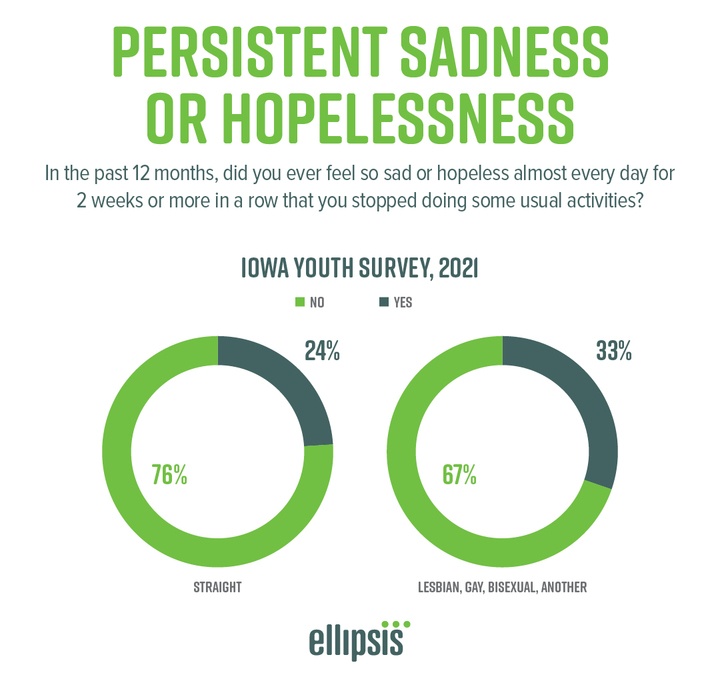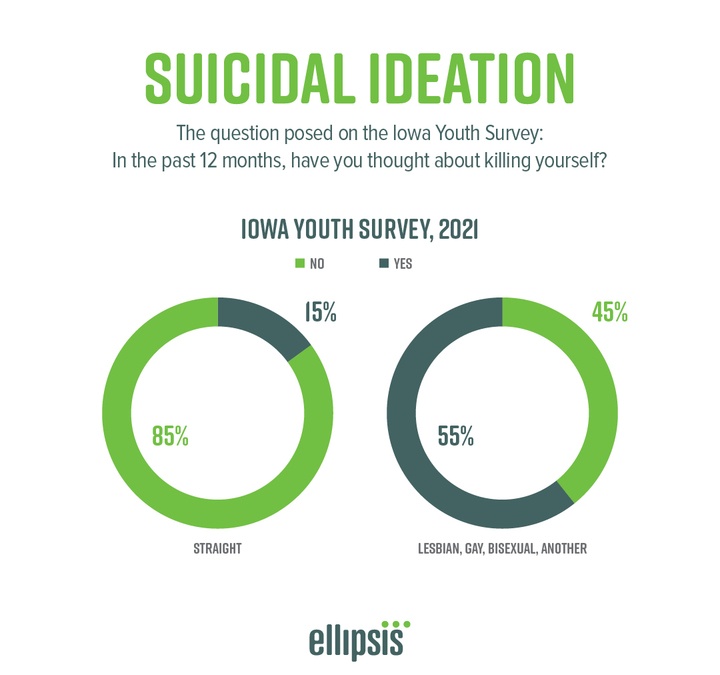According to Iowa Youth Survey data, our youth are struggling with their mental health.
At the minimum, about one-third of Iowa’s youth — more than ever before — reported feeling persistent sadness or hopelessness almost every day for two weeks or more in a row in 2021. The most disturbing finding: Some of Iowa’s youth are considering and attempting suicide.
In order to help our youth, we need to understand what they’re experiencing and how many are experiencing it. But we also want to provide some options for those who are championing their own mental health or the mental health of someone they love. In this article, we’ll share ways to recognize warning signs about these mental health issues and what you can do about it.
“Some adults don’t take children and teens’ mental health as seriously as they should, but I want to share a message with Iowa’s youth: Continue to speak up and don’t be discouraged. Changes are being made. Your voice, together with those who can advocate for you, can make some real change.”
Nikki Thomson, Chief Clinical Officer
Iowa’s youth experience persistent sadness and hopelessness.
In 2021, 27% of Iowa’s sixth graders reported feeling persistent sadness and hopelessness for two weeks or more that prevented them from carrying out typical activities, up from the 14% who reported this issue in 2016. Even more of Iowa Iowa’s high school juniors, 36% in 2021, reported the same experience, which is up from the 25% who reported that feeling in 2016.

How do you know if you or someone you love is experiencing more than just a few bad days? Persistent sadness or hopelessness may look, sound and feel like:
- Sadness, emptiness or feeling down for a week or more.
- Loss of interest in daily activities.
- Lack of energy.
- Low self-esteem.
- Trouble focusing.
- Irritability or mood swings.
- Changes in appetite, exercise or sleep patterns.
- Substance use.
What can I do?
- Voice your concerns.
- Call the Iowa Warm Line at 844-775- 9276, which is a non-crisis, confidential listening line for anyone struggling with mental health or substance use issues and is staffed by nonjudgmental people who know what you’re experiencing.
- Reach out to a school counselor or family doctor for information on next steps.
- Message Ellipsis at org. Our compassionate staff will explore options with you.
Iowa’s youth are having thoughts of suicide.
As many as 24% of Iowa’s high school juniors have experienced suicidal ideation, or thoughts of suicide, in 2021. Just over 20% of eighth graders and 17% of sixth graders reported having thoughts on suicide in 2021. Most unfortunately, 5% of those in eighth and 11th grades have attempted to die by suicide.

WARNING SIGNS for suicidal thoughts and actions.
- Talking about ending their life, feeling hopeless or having no reason to live.
- Feeling like a burden to others or trapped.
- Looking for ways to end their life.
- Giving away possessions.
- Isolation or extreme mood swings.
- Comorbid mental health struggles such as anxiety, depression or other mood or personality disorders.
What can I do?
- Call or text 988, the confidential national Suicide and Crisis Lifeline, or chat
- Call 988 and request mobile crisis services. A team of caring individuals will travel to wherever the person in need is within an hour in an unmarked vehicle to talk about how they can help.
- Share your thoughts in a trusted individual who listens to your concerns.
- Ask friends or family to stay with you, restrict access to harmful objects and check in with you frequently.
- If someone shares their thoughts of suicide with you, don’t react too emotionally as an emotional outburst can make them regret confiding in you or feel like they must bear your emotions.
- Message Ellipsis at org. Our compassionate staff will explore options with you.
Iowa’s LGBTQ+ youth are more at risk for mental health struggles.
We know that LGBTQ+ youth are at risk for and experience unique mental health difficulties because of the perceived stigma and prejudice that others can place on their sexuality and identity.
Of those survey respondents who are youth identifying in the LGBTQ+ community, a whopping 67% said in 2021 they experienced persistent sadness or hopelessness almost every day for two weeks or more in a row, which stopped them from doing some usual activities. That compares to the 24% of youth who identify as straight who responded similarly about experiencing persistent sadness or hopelessness.
Of serious concern: 55% of LGBTQ+ youth said they’d had suicidal thoughts in 2021.
"We aren’t serving our society well enough based on these statistics. It’s incredibly difficult to go against the grain, and our LGBTQ+ youth are just trying to be themselves. One small snide comment or discrimination can be a major setback for a teen’s mental health.
Nikki Thomson, Chief Clinical Officer
Please see the “warning signs” box above to make sure you don’t miss any signals given by your LGBTQ+ loved one.
If you identify as LGBTQ+ and are struggling, or if you know someone who is, here are some steps you can take.
What can I do?
- Call or text 988, the confidential national Suicide and Crisis Lifeline, or chat
- Contact The Trevor Project by calling 866-488-7386, texting 678-678 or chatting online.
- Find similar peer or family groups to support LGBTQ+ youth.
- Research how to support LGBTQ+ youth through resources like One Iowa, PFLAG or The Trevor Project.
- Don’t assume you know the struggles LGBTQ+ youth are experiencing. Instead, listen and ask how you can help.
- Message Ellipsis at org. Our compassionate staff will explore options with you.
If you or a loved one is struggling with their mental health, the staff at Ellipsis is more than happy to chat with you to see how we can help or connect you to those who can best serve your needs. Contact us here.


